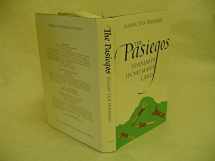
The Pasiegos: Spaniards in No Man's Land
ISBN-13:
9780226261737
ISBN-10:
0226261735
Edition:
First Edition
Author:
Susan Tax Freeman
Publication date:
1979
Publisher:
University of Chicago Press
Format:
Hardcover
291 pages
FREE US shipping
on ALL non-marketplace orders
Marketplace
from $10.56
USD
Marketplace offers
Seller
Condition
Note
Seller
Condition
Used - Good
Significant wear along the top edge of the dust jacket. Name inscription on front endpaper. The text is free of markings.
Book details
ISBN-13:
9780226261737
ISBN-10:
0226261735
Edition:
First Edition
Author:
Susan Tax Freeman
Publication date:
1979
Publisher:
University of Chicago Press
Format:
Hardcover
291 pages
Summary
The Pasiegos: Spaniards in No Man's Land (ISBN-13: 9780226261737 and ISBN-10: 0226261735), written by authors
Susan Tax Freeman, was published by University of Chicago Press in 1979.
With an overall rating of 4.3 stars, it's a notable title among other
books. You can easily purchase or rent The Pasiegos: Spaniards in No Man's Land (Hardcover) from BooksRun,
along with many other new and used
books
and textbooks.
And, if you're looking to sell your copy, our current buyback offer is $0.41.
Description
"This unique and fascinating study . . . transcends the usual ethnographic mode by dealing with local ethnography, regional society and culture, and national institutions and ideology together. It is, thus, both a case study of a curious and highly marginal ethnic group and a model for us to follow regarding the study of local-regional-national relationships." - Davydd Greenwood, Cornell University. The Pasiegos are cattle herders who inhavit a mountain zone high above the Atlantic coast in the Castilian province of Santander. Although there is no real evidence that they are ethnically distinct from other Spaniards, the Pasiegos have been classified among the "despised peoples' of northern Spain. The herders, in turn, are treated as inferiors by settled Pasiegos who have taken up commercial callings in the three town centers of the zone. In the nation at large, Pasiegos join a number of comparable peoples in the lower reaches of the social order, plying trades which through history have been left to foreigners and outcasts. Combining rich historical materials and genealogical analysis with a detailed field study of a Pasiego town, Susan Tax Freeman reveals the complex social structure that underlies what is often assumed to be a homogeneous countryside.


We would LOVE it if you could help us and other readers by reviewing the book
Book review

Congratulations! We have received your book review.
{user}
{createdAt}
by {truncated_author}


